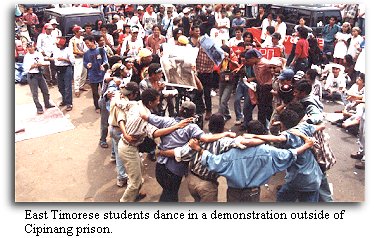|
|
|
The East Timor Action Network/U.S. (ETAN) said on Anniversary that one year after last year's historic independence vote, East Timor still lacks justice and security. "East Timor has begun to rebuild from last year's destruction, but much still needs to be done to assure justice and security for the world's newest country," said John M. Miller, spokesperson for the East Timor Action Network/U.S. ETAN called on the U.S. and other nations to support an international tribunal to prosecute those responsible East Timor's destruction and to strengthen East Timor's security by refusing to reestablish any military assistance to the Indonesian military and police until certain conditions are met, including an end to their human rights abuses, disarming and disbanding militias and arresting their leaders, and respect for East Timor's territorial integrity. The Indonesian government must also bring its armed forces under civilian control. "One year after the Indonesian military and its militias leveled East Timor, the government of Indonesia either can't or won't stop military support for militias violating East Timor's borders, attacking peacekeepers and UN relief personnel, and blocking the repatriation of more than 100,000 East Timorese refugees. Any form of U.S. assistance to the Indonesian military contributes to the unraveling of Indonesia's fragile democratization, betrays our commitment to genuine self-determination in East Timor, and violates the intent of Congress in withholding aid to human rights abusers," said Lynn Fredriksson, Washington Representative for ETAN. "An international tribunal is the only way to be sure that the victims of military and militia violence in East Timor have their day in court. A tribunal will have the added benefits of discouraging continued rights violations throughout Indonesia and promoting reconciliation in East Timor," said Miller. "The U.S., until recent years a major backer of Indonesia's invasion and occupation of East Timor, must provide substantial support for East Timor's development. The United States has a responsibility after arming and training East Timor's tormentors for so long," said John M. Miller. "Now that East Timor is free, the U.S. must support a just and peaceful future for the world's newest nation. The East Timorese need a full range of aid -- from health care to educational scholarships -- the U.S. should continue to contribute what is most needed, as Congress and the administration did at the end of 1999," added Miller. On August 30, 1999, the people of East Timor defying threats and violence turned out in record numbers to vote overwhelmingly for independence. Following the vote, Indonesian troops and their militia proxies destroyed some 70% of the country's infrastructure, killed more than one thousand people, and forced hundreds of thousands across the border into Indonesia. On September 9, the U.S. suspended military ties and threatened World Bank and IMF assistance to Indonesia. Soon after, the Indonesian military began to withdraw from East Timor and an international peacekeeping force entered. in November, the U.S. Congress restricted most military assistance to Indonesia until East Timorese refugees are returned, there is effective prosecution of military and militia members responsible for human rights atrocities in East Timor and Indonesia and other conditions regarding East Timor's security are met. But in July, the U.S. military began to re-engage with its Indonesian counterparts by conducting a joint exercise with Indonesian troops. In recent months, Indonesian military-backed militias have stepped up their activities in East Timor, killing two U.N. peacekeepers and several East Timorese. Militia attacks on aid workers over the past week forced UNHCR to suspend its activities in refugee camps in West Timor where some 100,000 East Timorese remain virtual hostages. Last week, in a set back to democratization, Indonesia amended its constitution, creating strong obstacles to prosecutions of past human rights abuses. Indonesian, East Timorese, and international organizations argue that an international tribunal is now the only option to bring military and militia leaders responsible for atrocities in East Timor to justice. The human rights situation has severely deteriorated in Indonesia in recent months. In Aceh, the military regularly violates the humanitarian ceasefire. Disappearances of human rights activists have also increased. A U.S. resident, Jafar Siddiq Hamzah, president of the International Forum On Aceh, disappeared on August 5 in Medan and has not been heard from since. ETAN has expressed strong concerns about Hamzah's safety. Last week in Papua people were shot for raising an independence flag. In a reprise of tactics used in East Timor, the Indonesian military has created militias which harass and terrorize the population. In the Moluccas, Indonesian soldiers have been observed fighting with militias on both sides of the conflict. The Indonesia invaded neighboring East Timor on December 7, 1975, hours after a state visit to Jakarta by then President Gerald Ford and Secretary of State Henry Kissinger. According to human rights groups, one-third of the population -- more than 200,000 East Timorese -- was killed in subsequent years as the U.S. provided weapons and political support under both Democratic and Republican administrations. " n end to poverty. These foot-soldiers are mobilisi |

